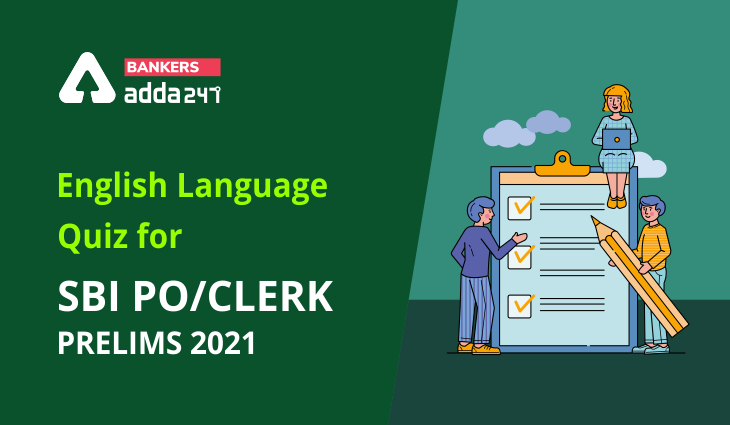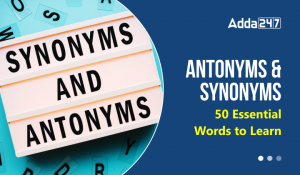
Directions (1-10): In the given passage there are blanks, each of which has been numbered. Against each, five words are suggested, one of which fits the blank appropriately. Find the appropriate word in each case.
With doubt, there is one thing …(1)… to all of us. We have played a game at some time in our lives. Most of us play to relax or have fun, but for many playing a game or a sport is a way to …(2)… poverty behind, In fact, in many African countries, playing professionally can …(3)… the lives of a person’s entire family.
For example, in the small town of Bekoji, in Ethiopia …(4)… than a hundred boys and girls can be seen running at dawn everyday. Each of these youth is …(5)… and serious and their coach is …(6)… that one of them will be a world champion. This seems like an idle …(7)… but it is virtually a gurantee in this small community …(8)… mainly farmers. Many of the fastest male and female distance runners in the world hail from this small town.
A small hand-painted sign which greets visitors outside bekoji …(9)… “Welcome to the village of Athletes”. Children here start running at an early age, …(10)… great distances to fetch water and firewood or to reach school. At the Olympics, runners from this small town are likely to win more medals than those from developed countries. It will give their families a way out of poverty.
Q1.
(a) accepted
(b) common
(c) alike
(d) similar
(e) popular
Q2.
(a) alleviate
(b) forgot
(c) prevent
(d) reduce
(e) leave
Q3.
(a) changes
(b) arrange
(c) control
(d) transform
(e) shift
Q4.
(a) further
(b) more
(c) greater
(d) over
(e) larger
Q5.
(a) concentrated
(b) rival
(c) focused
(d) playful
(e) performed
Q6.
(a) convince
(b) optimist
(c) intended
(d) privilege
(e) confident
Q7.
(a) boast
(b) suspicion
(c) risk
(d) worship
(e) precaution
Q8.
(a) existing
(b) that
(c) comprising
(d) consisting
(e) for
Q9.
(a) warn
(b) inform
(c) notices
(d) reads
(e) wish
Q10.
(a) covering
(b) driving
(c) measuring
(d) following
(e) competing
Directions (11-15) : Read each sentence to find out whether there is any grammatical error in it. The error if any will be in one part of the sentence, the number of that part will be the answer. If there is ‘No error’ mark (e) as the answer (Ignore errors of punctuation, if any)
Q11. Banks in India (a) / cannot open ATMs (b)/ except obtaining (c) / approval from RBI. (d)/ No error (e)
(a) a
(b) b
(c) c
(d) d
(e) e
Q12. Today the success of (a) / companies depends on the (b)/ quality of their products and(c) /efficient managing staff. (d) /No error (e)
(a) a
(b) b
(c) c
(d) d
(e) e
Q13. Ashok has managed to (a) / achieve his sales targets (b)/ for the quarter very easily (c) / than we expected. (d)/ No error (e)
(a) a
(b) b
(c) c
(d) d
(e) e
Q14. He did not grant (a) / their request for a loan (b)/ although it would (c) / displease his boss. (d) /No error (e)
(a) a
(b) b
(c) c
(d) d
(e) e
Q15. At present oil companies (a) / are making a loss of (b)/ rupees five on all (c) / litre of petrol that they sell. (d)/ No error (e)
(a) a
(b) b
(c) c
(d) d
(e) e
Solutions
S1. Ans.(b)
Sol. ‘Similar’ takes preposition ‘in’. And alike is used as, ‘We all are alike in one thing’. So, common is correct.
S2. Ans.(e)
Sol. Since ‘behind’ is there, unquestioningly ‘leave’ is the correct option.
S3. Ans.(d)
Sol. Option (a) is wrong since, no ‘s’ or ‘es’ is suffixed to a verb when using with ‘can’. Hence ‘transform’ is correct.
S4. Ans.(b)
Sol. ‘Greater than’ is used with numbers and ‘larger than’ is used with areas, etc. So, “name” is sutiable.
S5. Ans.(c)
S6. Ans.(e)
Sol. convince is in present tense so it is wrong. One may also get confused with option (b) but ‘confident’ goes well with the meaning of the passage.
S7. Ans.(a)
S8. Ans.(c)
Sol. ‘ Comprise something’ or ‘consist of something’ mean the same.
S9. Ans.(d);
S10. Ans.(a);
S11. Ans. (c)
Sol. “except” should be replaced by “without”
S12. Ans. (d)
Sol. “efficiency of” managing staff
S13. Ans. (c)
Sol. “more easily” than expected
S14. Ans. (e)
Sol. No error
S15. Ans. (c)
Sol. “each/every” litre instead of “all” litre, because litre is singular. More over in the context each or every litre is right.




 English Language Notes for Competitive E...
English Language Notes for Competitive E...










